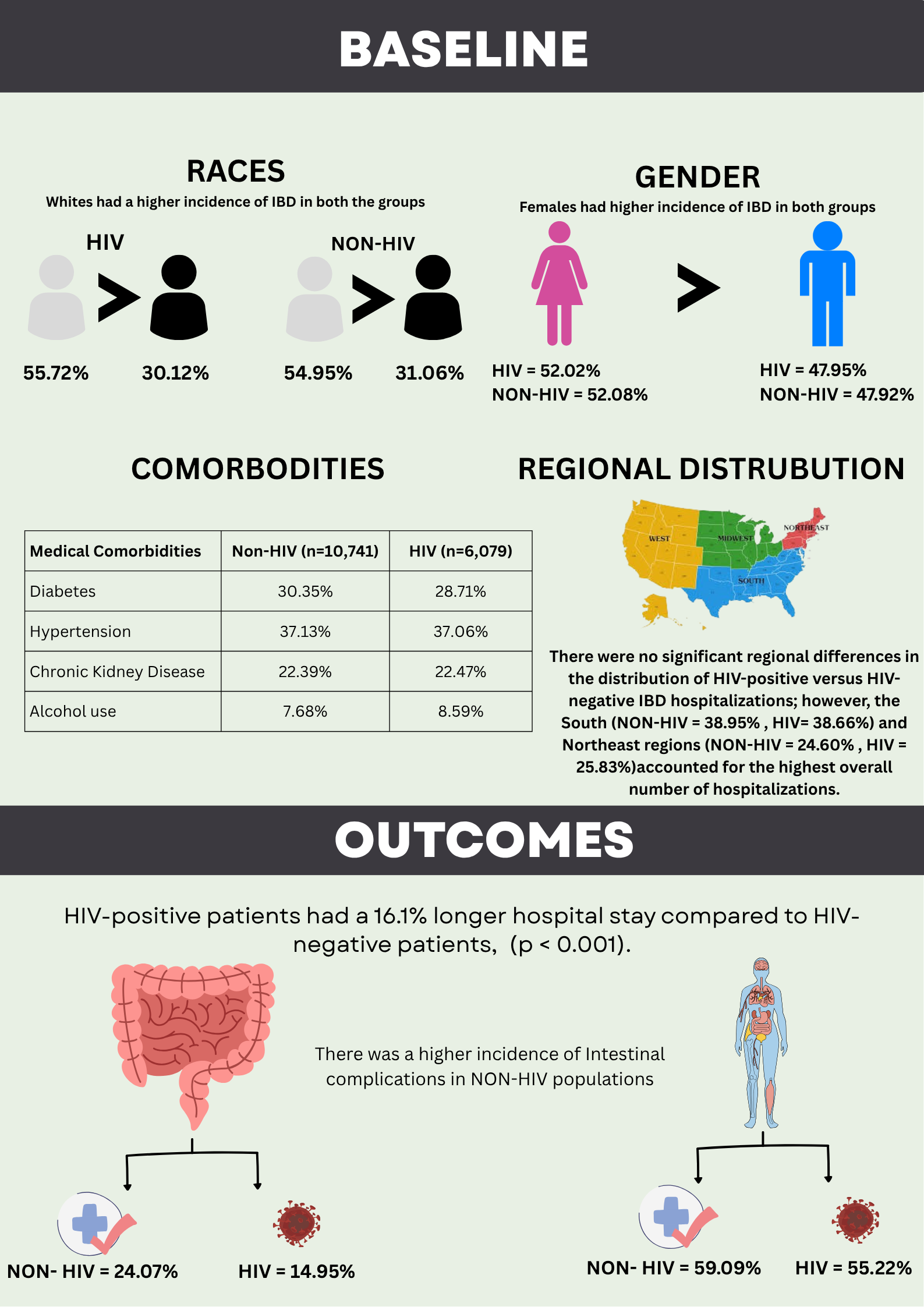Tuesday Poster Session
Category: IBD
P5453 - Epidemiology and Clinical Outcomes of Inflammatory Bowel Disease in Patients With and Without HIV: A 15-Year Study Using the National Inpatient Sample Database
Tuesday, October 28, 2025
10:30 AM - 4:00 PM PDT
Location: Exhibit Hall

Allah Dad, MD (he/him/his)
Shiekh Zayed Medical College Rahim Yar Khan, Pakistan
Kot Addu, Punjab, Pakistan
Presenting Author(s)
Adnan Bhat, MD1, Maulinkumar Patel, MBBS, MPH2, Tahreem Mari, MBBS3, Areesha Mansoor, 4, Kinza Bakht, MBBS5, Allah Dad, MD6, Ahmad Khan, 7, Samiullah Shaikh, MD8, Rehan Ishaque, 9, Omar Al-Radideh, MD10
1University of Florida, Gainesville, FL; 2The University of Texas Health Science Centre at Houston, Philadelphia, PA; 3Dow Medical College, Karachi, Sindh, Pakistan; 4Dow University of Health Sciences, Karachi, Sindh, Pakistan; 5Sheikh Zayed Medical College Rahim Yar Khan, Muzaffargarh, Punjab, Pakistan; 6Shiekh Zayed Medical College Rahim Yar Khan, Pakistan, Kot Addu, Punjab, Pakistan; 7Khyber Medical University, Peshawar, North-West Frontier, Pakistan; 8Liaquat University of Medical and Health Science, Hyderabad, Sindh, Pakistan; 9Liaquat University of Medical Health & Sciences, Hyderabad, Sindh, Pakistan; 10University of Florida College of Medicine, Gainesville, FL
Introduction: Inflammatory bowel disease (IBD) is a chronic gastrointestinal disease with a rising prevalence and significant impacts on quality of life and healthcare systems. With improved survival due to antiretroviral therapy, people living with HIV increasingly present with chronic comorbidities, including IBD. However, the clinical interaction between IBD and HIV remains poorly understood due to their opposing immunologic mechanisms. This study analyzes National Inpatient Sample (NIS) data to compare the prevalence, trends, and in-hospital outcomes of IBD among HIV-positive versus HIV-negative patients.
Methods: We conducted a retrospective cohort study using NIS data (2008-2022), identifying adults hospitalized with IBD via ICD-10 and ICD-9 codes. The primary aim was to compare prevalence and baseline demographic characteristics of IBD among HIV-positive and negative patients. Secondary outcomes included in-hospital mortality, length of stay (LOS), gastrointestinal and extraintestinal complications. Multivariable logistic regression was adjusted for relevant demographic and clinical covariates.
Results: We analyzed 16,820 propensity-score matched hospitalized IBD patients. IBD prevalence was lower among HIV-positive patients (6,079) compared to HIV-negative patients (10,741). Baseline demographics were similar, though diabetes was slightly more common in HIV-negative patients (30.4% vs. 28.7%, p=0.025), and alcohol use was higher in HIV-positive patients (8.6% vs. 7.7%, p=0.038).
HIV-positive patients had significantly fewer intestinal complications (p< 0.05), including rectal bleeding (3.4% vs. 7.2%), obstruction (3.8% vs. 5.9%), fistula (1.8% vs. 3.6%), abscess (1.5% vs. 2.5%), perforation (0.35% vs. 0.74%), as well as lower malnutrition rate (10.2% vs. 11.8%). However, the differences in mortality, sepsis, acute kidney injury, and thromboembolic events among both groups were non-significant. Besides, HIV-positive patients had longer LOS (median 5 vs. 4 days, p< 0.001). Multivariable analysis confirmed lower odds of GI complications and malnutrition but a 16.1% longer LOS in HIV-positive patients (aOR 1.16, p< 0.001).
Discussion: HIV-positive hospitalized IBD patients demonstrated lower gastrointestinal complication rates but had significantly longer hospital stays compared to HIV-negative patients. These findings suggest a distinct clinical profile in HIV-positive IBD patients, warranting further investigation into underlying immunologic and treatment-related factors.

Figure: Epidemiology and clinical outcomes of IBD in patients with and without HIV
Disclosures:
Adnan Bhat indicated no relevant financial relationships.
Maulinkumar Patel indicated no relevant financial relationships.
Tahreem Mari indicated no relevant financial relationships.
Areesha Mansoor indicated no relevant financial relationships.
Kinza Bakht indicated no relevant financial relationships.
Allah Dad indicated no relevant financial relationships.
Ahmad Khan indicated no relevant financial relationships.
Samiullah Shaikh indicated no relevant financial relationships.
Rehan Ishaque indicated no relevant financial relationships.
Omar Al-Radideh indicated no relevant financial relationships.
Adnan Bhat, MD1, Maulinkumar Patel, MBBS, MPH2, Tahreem Mari, MBBS3, Areesha Mansoor, 4, Kinza Bakht, MBBS5, Allah Dad, MD6, Ahmad Khan, 7, Samiullah Shaikh, MD8, Rehan Ishaque, 9, Omar Al-Radideh, MD10. P5453 - Epidemiology and Clinical Outcomes of Inflammatory Bowel Disease in Patients With and Without HIV: A 15-Year Study Using the National Inpatient Sample Database, ACG 2025 Annual Scientific Meeting Abstracts. Phoenix, AZ: American College of Gastroenterology.
1University of Florida, Gainesville, FL; 2The University of Texas Health Science Centre at Houston, Philadelphia, PA; 3Dow Medical College, Karachi, Sindh, Pakistan; 4Dow University of Health Sciences, Karachi, Sindh, Pakistan; 5Sheikh Zayed Medical College Rahim Yar Khan, Muzaffargarh, Punjab, Pakistan; 6Shiekh Zayed Medical College Rahim Yar Khan, Pakistan, Kot Addu, Punjab, Pakistan; 7Khyber Medical University, Peshawar, North-West Frontier, Pakistan; 8Liaquat University of Medical and Health Science, Hyderabad, Sindh, Pakistan; 9Liaquat University of Medical Health & Sciences, Hyderabad, Sindh, Pakistan; 10University of Florida College of Medicine, Gainesville, FL
Introduction: Inflammatory bowel disease (IBD) is a chronic gastrointestinal disease with a rising prevalence and significant impacts on quality of life and healthcare systems. With improved survival due to antiretroviral therapy, people living with HIV increasingly present with chronic comorbidities, including IBD. However, the clinical interaction between IBD and HIV remains poorly understood due to their opposing immunologic mechanisms. This study analyzes National Inpatient Sample (NIS) data to compare the prevalence, trends, and in-hospital outcomes of IBD among HIV-positive versus HIV-negative patients.
Methods: We conducted a retrospective cohort study using NIS data (2008-2022), identifying adults hospitalized with IBD via ICD-10 and ICD-9 codes. The primary aim was to compare prevalence and baseline demographic characteristics of IBD among HIV-positive and negative patients. Secondary outcomes included in-hospital mortality, length of stay (LOS), gastrointestinal and extraintestinal complications. Multivariable logistic regression was adjusted for relevant demographic and clinical covariates.
Results: We analyzed 16,820 propensity-score matched hospitalized IBD patients. IBD prevalence was lower among HIV-positive patients (6,079) compared to HIV-negative patients (10,741). Baseline demographics were similar, though diabetes was slightly more common in HIV-negative patients (30.4% vs. 28.7%, p=0.025), and alcohol use was higher in HIV-positive patients (8.6% vs. 7.7%, p=0.038).
HIV-positive patients had significantly fewer intestinal complications (p< 0.05), including rectal bleeding (3.4% vs. 7.2%), obstruction (3.8% vs. 5.9%), fistula (1.8% vs. 3.6%), abscess (1.5% vs. 2.5%), perforation (0.35% vs. 0.74%), as well as lower malnutrition rate (10.2% vs. 11.8%). However, the differences in mortality, sepsis, acute kidney injury, and thromboembolic events among both groups were non-significant. Besides, HIV-positive patients had longer LOS (median 5 vs. 4 days, p< 0.001). Multivariable analysis confirmed lower odds of GI complications and malnutrition but a 16.1% longer LOS in HIV-positive patients (aOR 1.16, p< 0.001).
Discussion: HIV-positive hospitalized IBD patients demonstrated lower gastrointestinal complication rates but had significantly longer hospital stays compared to HIV-negative patients. These findings suggest a distinct clinical profile in HIV-positive IBD patients, warranting further investigation into underlying immunologic and treatment-related factors.

Figure: Epidemiology and clinical outcomes of IBD in patients with and without HIV
Disclosures:
Adnan Bhat indicated no relevant financial relationships.
Maulinkumar Patel indicated no relevant financial relationships.
Tahreem Mari indicated no relevant financial relationships.
Areesha Mansoor indicated no relevant financial relationships.
Kinza Bakht indicated no relevant financial relationships.
Allah Dad indicated no relevant financial relationships.
Ahmad Khan indicated no relevant financial relationships.
Samiullah Shaikh indicated no relevant financial relationships.
Rehan Ishaque indicated no relevant financial relationships.
Omar Al-Radideh indicated no relevant financial relationships.
Adnan Bhat, MD1, Maulinkumar Patel, MBBS, MPH2, Tahreem Mari, MBBS3, Areesha Mansoor, 4, Kinza Bakht, MBBS5, Allah Dad, MD6, Ahmad Khan, 7, Samiullah Shaikh, MD8, Rehan Ishaque, 9, Omar Al-Radideh, MD10. P5453 - Epidemiology and Clinical Outcomes of Inflammatory Bowel Disease in Patients With and Without HIV: A 15-Year Study Using the National Inpatient Sample Database, ACG 2025 Annual Scientific Meeting Abstracts. Phoenix, AZ: American College of Gastroenterology.
